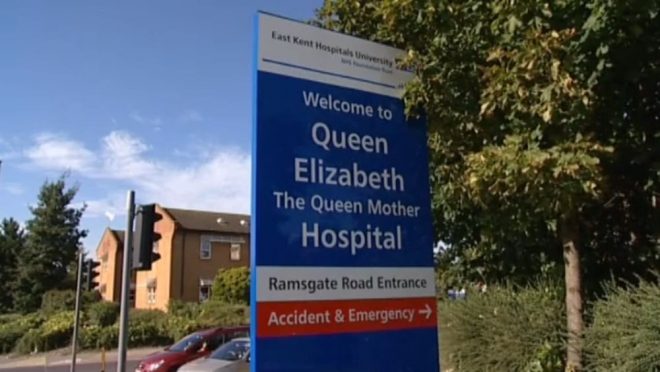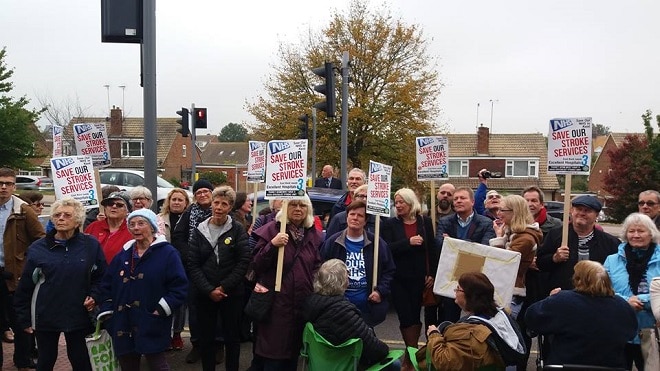
South Thanet MP Craig Mackinlay has branded the decision by Kent and Medway health chiefs to close acute services at QEQM Hospital in Margate in favour of a specialist unit at Ashford “disappointing.”
But the MP says it is also time to “calm down the political rhetoric” and acknowledge the “positive improvements” that three hyper-acute stroke units will bring to the area.
On February 14, doctors on the Joint Committee of Clinical Commissioning Groups (JCCCG) voted in favour of proposals to overhaul stroke services and implement three hyper-acute units (HASUs) across Kent and Medway. Six doctors were absent from the vote.
HASUs, with seven day/24 hour specialist staffing and equipment, will be at Darent Valley Hospital, Maidstone Hospital and William Harvey Hospital – meaning the closure of acute services at Margate’s QEQM Hospital, Medway Hospital and Tunbridge Wells Hospital. Kent & Canterbury Hospital has already had its service withdrawn due to the removal of training doctors by Health Education England in March 2017.
The JCCCG expects the hyper-acute units at Darent Valley and Maidstone to go live in March 2020 followed by the William Harvey Hospital in spring 2021.
‘Fourth unit’

Mr Mackinlay said: “The decision of the Joint Committee to approve a three HASU model for Kent & Medway with Darent Valley, Maidstone and The William Harvey hospitals emerging as the final option is a huge disappointment to the residents of Thanet, and to campaigners who argued strongly that the QEQM at Margate should be a preferred third site, and a personal disappointment to me. The outcome I had been campaigning for was for a fourth HASU at the Queen Elizabeth the Queen Mother hospital (QEQM, Margate).”
But he said, in light of the ‘shamefully poor’ stroke care across Kent and Medway – with QEQM rated a D from a possible A to E scoring – “more is the pity that we must wait until 2021 for the new configuration which will have better health outcomes, despite the issues of local accessibility.”
‘Reassured’
He acknowledged fears that Thanet patients would have to travel too far, with journey times to Ashford taking over an hour but added: “I am somewhat reassured that the HASU formula ensures that specialist stroke teams are likely to be better prepared for arrival of patients, will have dedicated stroke staff 24/7 and with the team, the very best of equipment meaning more rapid scans and treatment once at the hospital. This stands in some contrast to the situation now, whereby journey time might be short, but patients enter the waiting queue of ambulance arrivals and delay during triage assessments.”
Mr Mackinlay said NHS bosses were committed to improved rehabilitation services locally, adding: “Improvements to the ambulance pool are also proposed so that the time from call to pick-up can be minimised and improved for Thanet. The most serious cases of brain bleed will result in transfer to specialists in London, as now.
“The Joint Committee recognises that should a new Canterbury hospital emerge, then it would be likely that HASU facilities would move there from Ashford; all would welcome this proposal.”
The MP added that the issue should not be “used as a political football.”

Save Our NHS in Kent has been fighting for a fourth HASU at QEQM saying journey times from Thanet to Ashford will put lives at risk. The group is now urging members of the Kent County Council’s health scrutiny committee to vote to refer the decision back to government when they discuss it again on March 1.
In response to Mr Mackinlay’s statement SONIK has written to the MP saying: “We must reiterate to you that this plan is dangerous for your constituents, and that the executives behind it have failed to provide adequate evidence for the claims they make about saving lives. On August 6th 2018, you said “I require the NHS planners to bring better evidence to the table”. No new evidence of the kind required has been produced since then, so can you explain why you have changed your mind?
“If you continue to support the JCCCG decision after being in possession of the facts in this report (SONIK research against HASU plan), then it will be remembered that you did so in the knowledge that the plans will seriously harm the health of your constituents and very likely lead to the eventual closure of the hospital and the loss of jobs.”

